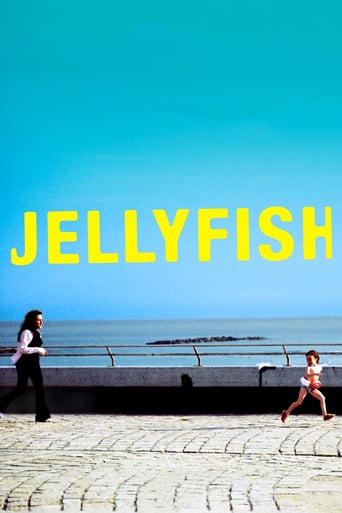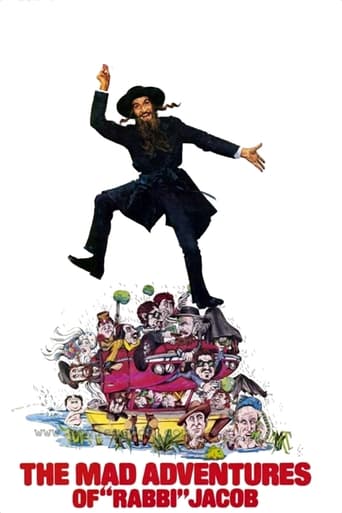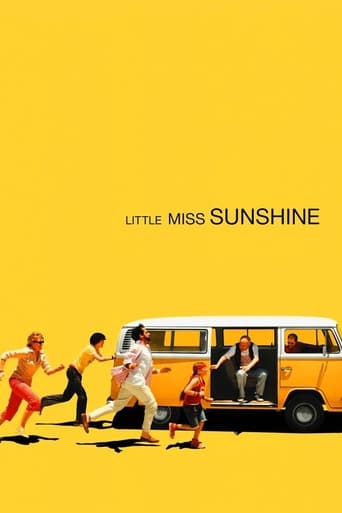


Jellyfish
Meduzot (the Hebrew word for Jellyfish) tells the story of three very different Israeli women living in Tel Aviv whose intersecting stories weave an unlikely portrait of modern Israeli life. Batya, a catering waitress, takes in a young child apparently abandoned at a local beach. Batya is one of the servers at the wedding reception of Keren, a young bride who breaks her leg in trying to escape from a locked toilet stall, which ruins her chance at a romantic honeymoon in the Caribbean. One of the guests is Joy, a Philippine chore woman attending the event with her employer, and who doesn't speak any Hebrew (she communicates mainly in English), and who is guilt-ridden after having left her young son behind in the Philippines.
-
- Cast:
- Sarah Adler , Assi Dayan


Similar titles










Reviews
For all the hype it got I was expecting a lot more!
Don't listen to the Hype. It's awful
Pretty good movie overall. First half was nothing special but it got better as it went along.
Exactly the movie you think it is, but not the movie you want it to be.
The movie has a multi-layered plot rich with symbolism. The elfin from the sea, who refuses to take off her float ring, is a jellyfish, which somehow symbolizes unfulfilled childhood wishes. The corporate strong woman, or politician, whose appearances on TV and posters punctuate the movie, laments nowadays parents fail to give their children anything. The main character Batya, while she was a child, had a deep craving for ice-cream while on the beach but the ice-cream man was turned away by her mother. The jellyfish elfin shows Batya a photo album with only one picture in it, and it is the ice-cream man on the beach, with a breeze blowing his shirt (as it moves on the photo). When the mysterious poetess, who has given up her suite to the honeymooners, commits suicide, the groom Michael finds a dead jellyfish under his feet on the beach. The jellyfish imagery is aquatic, as the poetess refers to a ship in the bottle, sealed up and not feeling any wind and thus stagnant. The Filipino domestic helper, Joy, wants to buy a large ship model for her son back home. When for the second time she gazes at the toy boat in the shop's display window, a magical effect appears: the little sails are fed by the wind, as if a real-life ship is on high sea—a little stirring of real life, like the ice-cream man's shirt catching a breeze in the photo? A third time in front of the shop, she finds it sold and becomes very much dejected, only to find it in her employer Malka's living room, meant as a gift to her. So, Joy is the only one that succeeds in giving her child something. The parent-child disappointment is not a one-way traffic, as Malka's daughter who hires the Filipino helper Joy to take care of her aging mother tries to win some acclaim to her performance in Hamlet, and all she gets from her mother is: "You lied on the floor half of the time, and uttering words that are not understandable even to people on stage!" At the end of the movie, the actress lady stares from the street resentfully through the window as her mother Malka embraces Joy inside the house.
Am I the only one that sees thru this crap? Lets start with the title - The big metaphor her - Jellyfish - drifting away, taken by the currents which carries them away as it pleases, like the "characters" in the film. GIVE ME A BREAK, I would be ashamed to submit this to my literature teacher at 9th grade in high-school. No (real) deeper meaning, no prose, the dialogue is very unauthentic, the stories inter-cut in random and meaningless ways and do not create a whole which is bigger than its parts. Heavy handed, edits and artificial framing that draw attention to themselves, and a long take that screams "I'm a long take, look at me!" Bad lighting and sound design. So the mother was a bad mother to her daughter, whose apartment is flooded, and is busy fund-raising to the homeless and poor while her daughter is homeless herself. Wow that's what I call deep irony - not.
When the film started I got the feeling this was going to be something special. The acting and camera work were undoubtedly good. I also liked the characters and could have grown to empathise with them. The film had a good atmosphere and there was a hint of fantasy.However, as the film went on, the plot never appeared to takeoff and just rolled on scene by scene. I was unable to understand the connection between the stories. All I could see was the characters occasionally bumping into each other and references to ships in bottles. Without that connection, I was just left with a few unremarkable short stories.Am surprised it did so well at Cannes
I went to see this because I'd never seen Tel-Aviv, where the story is set. I was disappointed, since it doesn't offer many views of Israel's largest metropolis. It's also pretentiousone of those movies that leaves you guessing at its meaning until you ultimately give up with a shrug of the shoulders.The main protagonist is Batya, a woman in her twenties' who works as a waitress at catered weddings. Her parents evidently don't care about her very much, and when a little girl walks out of the sea with an inflatable ring around her, Batya feels compelled to take care of her. The little girl doesn't speak, and Batya can't give her to social services because it's the weekend and the agency is closed. So she takes her back to her apartment with the leaky roof, and when it comes time to work in the evening, she has to take the little girl with her. The boss is very unhappy about this and other shortcomings in Batya's work performance.Another main character is Keren, who is getting married. At her wedding party (where Batya is of course working), she breaks her leg climbing out of a ladies' room cubicle whose door won't open, and so she and her new husband cannot take the Caribbean vacation they've planned. They end up in a dingy hotel on the seafront without a view. It smells bad, there is noise from the traffic, and Keren is complaining all the time. Her husband meets a strangely attractive older woman a writer who is also staying in the hotel, and Keren worries that he has slept with this stranger.The third main character is a Filipino woman named Joy who looks after old people. The old woman she is hired to care for is very crabby and speaks no English, only German and Hebrew. Joy speaks English but no Hebrew or German. Joy is mostly concerned with how her son is doing back in the Philippines, and wants to buy him a toy boat, as he has asked. She finds the perfect boat in a store and plans to buy it. The daughter of the old woman, who hired Joy, is an actress appearing in some sort of post-modern "physical theater" adaptation of Hamlet, and does not get along with her mother.The way in which these three storieswhich intersect momentarilyresolve themselves is presumably supposed to mean something profound. I didn't get it. There is a fantasy element to Batya's relationship with the little girl, and maybe Batya's non-existent relationship with her parents is somehow inverted in this relationship. When Joy sees the toy boat in the shop window, there is a strange effect used where the little sails billow as if blown by the wind, and they do this as if they are on the scale of a real-life ship. Keren draws the outline of a bottle around a ship that is on a brochure cover in the hotel room, and a narration of the strange woman's poetry mentions a ship in a bottle. But what does all this mean? I thought about it for a while and realized I wasn't going to lose any sleep in the process. If anyone out there has a clear idea of what it's all about, maybe they can fill me in.
